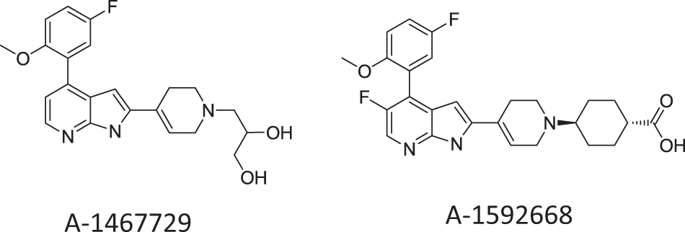Leukemia ( IF 12.8 ) Pub Date : 2019-12-11 , DOI: 10.1038/s41375-019-0652-0 Darren C Phillips 1 , Sha Jin 1 , Gareth P Gregory 2, 3 , Qi Zhang 4 , John Xue 1 , Xiaoxian Zhao 5 , Jun Chen 6 , Yunsong Tong 1 , Haichao Zhang 1 , Morey Smith 1 , Stephen K Tahir 1 , Rick F Clark 1 , Thomas D Penning 1 , Jennifer R Devlin 2, 7 , Jake Shortt 3 , Eric D Hsi 5 , Daniel H Albert 1 , Marina Konopleva 4 , Ricky W Johnstone 2, 7 , Joel D Leverson 8 , Andrew J Souers 1

|
MCL-1 is one of the most frequently amplified genes in cancer, facilitating tumor initiation and maintenance and enabling resistance to anti-tumorigenic agents including the BCL-2 selective inhibitor venetoclax. The expression of MCL-1 is maintained via P-TEFb-mediated transcription, where the kinase CDK9 is a critical component. Consequently, we developed a series of potent small-molecule inhibitors of CDK9, exemplified by the orally active A-1592668, with CDK selectivity profiles that are distinct from related molecules that have been extensively studied clinically. Short-term treatment with A-1592668 rapidly downregulates RNA pol-II (Ser 2) phosphorylation resulting in the loss of MCL-1 protein and apoptosis in MCL-1-dependent hematologic tumor cell lines. This cell death could be attenuated by either inhibiting caspases or overexpressing BCL-2 protein. Synergistic cell killing was also observed between A-1592668 or the related analog A-1467729, and venetoclax in a number of hematologic cell lines and primary NHL patient samples. Importantly, the CDK9 inhibitor plus venetoclax combination was well tolerated in vivo and demonstrated efficacy superior to either agent alone in mouse models of lymphoma and AML. These data indicate that CDK9 inhibitors could be highly efficacious in tumors that depend on MCL-1 for survival or when used in combination with venetoclax in malignancies dependent on MCL-1 and BCL-2.
中文翻译:

新型CDK9抑制剂可在多种血液系统恶性肿瘤模型中提高venetoclax(ABT-199)的功效。
MCL-1是癌症中最常见的扩增基因之一,可促进肿瘤的发生和维持,并能使包括BCL-2选择性抑制剂Venetoclax在内的抗肿瘤发生剂产生耐药性。MCL-1的表达通过P-TEFb介导的转录得以维持,其中CDK9激酶是关键成分。因此,我们开发了一系列有效的CDK9小分子抑制剂,以口服活性A-1592668为例,其CDK选择性与临床上已广泛研究的相关分子不同。A-1592668的短期治疗可迅速下调RNA pol-II(Ser 2)的磷酸化作用,从而导致MCL-1依赖性血液肿瘤细胞系中MCL-1蛋白的丢失和细胞凋亡。这种细胞死亡可以通过抑制胱天蛋白酶或过表达BCL-2蛋白来减轻。在许多血液细胞系和原发性NHL患者样品中,在A-1592668或相关类似物A-1467729与venetoclax之间也观察到协同细胞杀伤作用。重要的是,CDK9抑制剂加Venetoclax组合在体内具有良好的耐受性,并且在淋巴瘤和AML小鼠模型中显示出优于任何一种单独药物的疗效。这些数据表明,CDK9抑制剂在依赖MCL-1生存的肿瘤中或与venetoclax联合用于依赖MCL-1和BCL-2的恶性肿瘤中可能是高效的。重要的是,CDK9抑制剂加Venetoclax组合在体内具有良好的耐受性,并且在淋巴瘤和AML小鼠模型中显示出优于任何一种单独药物的疗效。这些数据表明,CDK9抑制剂在依赖MCL-1生存的肿瘤中或与venetoclax联合用于依赖MCL-1和BCL-2的恶性肿瘤中可能是高效的。重要的是,CDK9抑制剂加Venetoclax组合在体内具有良好的耐受性,并且在淋巴瘤和AML小鼠模型中显示出优于任何一种单独药物的疗效。这些数据表明,CDK9抑制剂在依赖MCL-1生存的肿瘤中或与venetoclax联合用于依赖MCL-1和BCL-2的恶性肿瘤中可能是高效的。











































 京公网安备 11010802027423号
京公网安备 11010802027423号